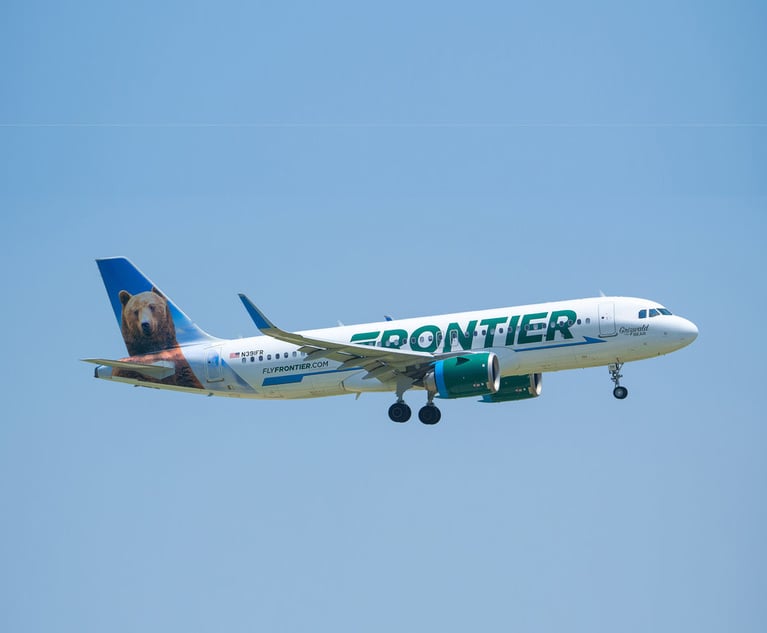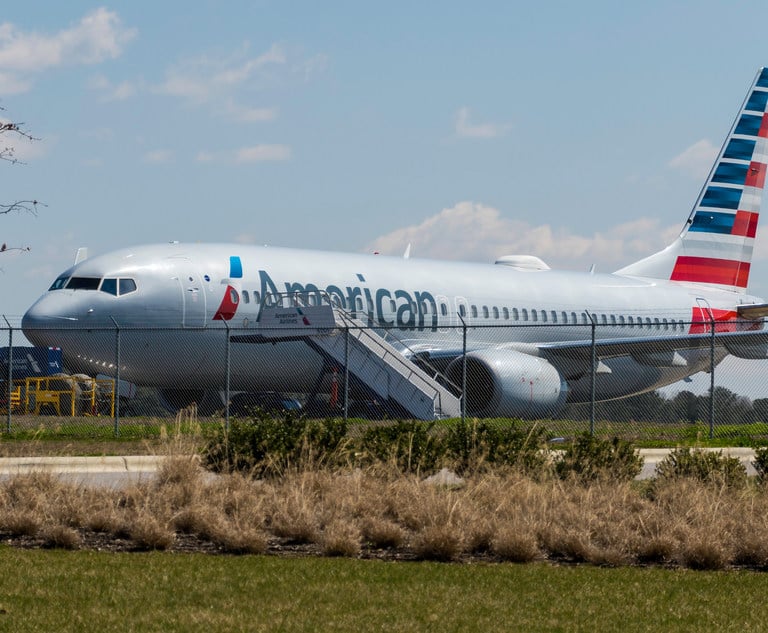 Wreckage is piled at the crash scene of an Ethiopian Airlines flight crash near Bishoftu, or Debre Zeit, south of Addis Ababa, Ethiopia, March 11, 2019. The crash killed 157 people. (AP Photo/Mulugeta Ayene)
Wreckage is piled at the crash scene of an Ethiopian Airlines flight crash near Bishoftu, or Debre Zeit, south of Addis Ababa, Ethiopia, March 11, 2019. The crash killed 157 people. (AP Photo/Mulugeta Ayene)Kline & Specter Sues Boeing Over Crash of Ethiopian Airlines' 737 Max 8
Andrew Stern of Kline & Specter filed the lawsuit in the U.S. District Court for the Northern District of Illinois on behalf of the estate of Manisha Nukavarapu, an Indian citizen who was a legal resident of Tennessee at the time of the crash.
April 17, 2019 at 05:50 PM
4 minute read
The original version of this story was published on Law.com
A lead attorney in the Philadelphia Salvation Army building collapse litigation filed suit against Boeing on behalf of a woman who died during the March crash of a 737 Max 8 plane in Ethiopia.
Andrew Stern of Kline & Specter in Philadelphia filed the lawsuit Wednesday in the U.S. District Court for the Northern District of Illinois on behalf of the estate of Manisha Nukavarapu, an Indian citizen who was a legal resident of Tennessee at the time of the crash. The suit alleges products liability, negligence, breach of warrant and civil conspiracy.
In a footnote, the complaint said the plaintiff also intended to sue the U.S. Federal Aviation Administration under the Federal Tort Claims Act for alleged negligence in improperly certifying the plane.
Nukavarapu, who was a medical resident at East Tennessee State University, was killed along with 156 others when a Boeing 737 Max 8 that had been set to fly from Ethiopia to Kenya crashed March 10. The circumstances of the Ethiopian Air flight's crash bore resemblances to that of another 737 Max 8 aircraft owned by Lion Air that crashed Oct. 29, killing 189 people.
Along with Stern and Elizabeth Crawford of Kline & Specter, Joseph Power of Power Rogers & Smith in Chicago and R. Wayne Culbertson in Kingsport, Tennessee, are representing Nukavarapu.
Stern, who focuses on representing plaintiffs in complex litigation, was a lead attorney in the high-profile lawsuit against the Salvation Army stemming from a building collapse that left seven dead and 12 injured. That litigation ended with a $227 million settlement, and Stern's client, Mariya Plekan, was awarded $95.6 million from that amount. Stern said at the time that her award was the largest recovery for an injured individual in Pennsylvania history.
When reached for comment Wednesday, Stern said he did not want to comment about Nukavarapu's case beyond the complaint, but added that he “looks forward to prosecuting this case on behalf of the victims of this otherwise preventable catastrophe.”
A spokesman for Boeing declined to comment about the lawsuit directly, but said, “Boeing extends our heartfelt condolences and sympathies to the families and loved ones of those onboard Ethiopian Airlines Flight 302. As the investigation continues, Boeing is cooperating fully with the investigating authorities.”
The complaint in Kondaveeti v. Boeing focuses on alleged problems with the plane's automated flight control system, which is called the Maneuvering Characteristics Augmentation System. The system is meant to help stabilize an airplane to stop it from stalling. But, the complaint alleges, the system on the 737 Max 8 improperly forced planes into unwarranted dives at low altitudes. Specifically, the complaint said the system relied on only one sensor and failed to properly account for the flight characteristic changes that occurred with the plane's more powerful engines.
The complaint, which was filed by Paul Kondaveeti as administrator of Nukavarapu's estate, also contended that Boeing did not tell the airlines that additional training was needed about the MCAS, and failed to take adequate steps once problems with the aircraft began to arise.
“Defendant Boeing's conduct was outrageous and was the direct cause of this disaster, which otherwise would not have occurred had there been compliance with basic principles of safe aircraft design and pilot training,” the complaint said.
The lawsuit also seeks punitive damages.
This content has been archived. It is available through our partners, LexisNexis® and Bloomberg Law.
To view this content, please continue to their sites.
Not a Lexis Subscriber?
Subscribe Now
Not a Bloomberg Law Subscriber?
Subscribe Now
NOT FOR REPRINT
© 2024 ALM Global, LLC, All Rights Reserved. Request academic re-use from www.copyright.com. All other uses, submit a request to [email protected]. For more information visit Asset & Logo Licensing.
You Might Like
View All
Passenger Sues Frontier Airlines for Burns Sustained From In-Flight Beverage
3 minute read

American Airline Passengers Removed for Doing 'Absolutely Nothing Wrong' Cleared to Proceed With Litigation
5 minute read
Trending Stories
- 1SEC’s Latest Enforcement Actions Fuel Demand for Big Law
- 2Sterlington Brings On Former Office Leader From Ashurst
- 3DOJ Takes on Largest NFT Scheme That Points to Larger Trend
- 4Arnold & Porter Matches Market Year-End Bonus, Requires Billable Threshold for Special Bonuses
- 5Advising 'Capital-Intensive Spaces' Fuels Corporate Practice Growth For Haynes and Boone
Who Got The Work
Michael G. Bongiorno, Andrew Scott Dulberg and Elizabeth E. Driscoll from Wilmer Cutler Pickering Hale and Dorr have stepped in to represent Symbotic Inc., an A.I.-enabled technology platform that focuses on increasing supply chain efficiency, and other defendants in a pending shareholder derivative lawsuit. The case, filed Oct. 2 in Massachusetts District Court by the Brown Law Firm on behalf of Stephen Austen, accuses certain officers and directors of misleading investors in regard to Symbotic's potential for margin growth by failing to disclose that the company was not equipped to timely deploy its systems or manage expenses through project delays. The case, assigned to U.S. District Judge Nathaniel M. Gorton, is 1:24-cv-12522, Austen v. Cohen et al.
Who Got The Work
Edmund Polubinski and Marie Killmond of Davis Polk & Wardwell have entered appearances for data platform software development company MongoDB and other defendants in a pending shareholder derivative lawsuit. The action, filed Oct. 7 in New York Southern District Court by the Brown Law Firm, accuses the company's directors and/or officers of falsely expressing confidence in the company’s restructuring of its sales incentive plan and downplaying the severity of decreases in its upfront commitments. The case is 1:24-cv-07594, Roy v. Ittycheria et al.
Who Got The Work
Amy O. Bruchs and Kurt F. Ellison of Michael Best & Friedrich have entered appearances for Epic Systems Corp. in a pending employment discrimination lawsuit. The suit was filed Sept. 7 in Wisconsin Western District Court by Levine Eisberner LLC and Siri & Glimstad on behalf of a project manager who claims that he was wrongfully terminated after applying for a religious exemption to the defendant's COVID-19 vaccine mandate. The case, assigned to U.S. Magistrate Judge Anita Marie Boor, is 3:24-cv-00630, Secker, Nathan v. Epic Systems Corporation.
Who Got The Work
David X. Sullivan, Thomas J. Finn and Gregory A. Hall from McCarter & English have entered appearances for Sunrun Installation Services in a pending civil rights lawsuit. The complaint was filed Sept. 4 in Connecticut District Court by attorney Robert M. Berke on behalf of former employee George Edward Steins, who was arrested and charged with employing an unregistered home improvement salesperson. The complaint alleges that had Sunrun informed the Connecticut Department of Consumer Protection that the plaintiff's employment had ended in 2017 and that he no longer held Sunrun's home improvement contractor license, he would not have been hit with charges, which were dismissed in May 2024. The case, assigned to U.S. District Judge Jeffrey A. Meyer, is 3:24-cv-01423, Steins v. Sunrun, Inc. et al.
Who Got The Work
Greenberg Traurig shareholder Joshua L. Raskin has entered an appearance for boohoo.com UK Ltd. in a pending patent infringement lawsuit. The suit, filed Sept. 3 in Texas Eastern District Court by Rozier Hardt McDonough on behalf of Alto Dynamics, asserts five patents related to an online shopping platform. The case, assigned to U.S. District Judge Rodney Gilstrap, is 2:24-cv-00719, Alto Dynamics, LLC v. boohoo.com UK Limited.
Featured Firms
Law Offices of Gary Martin Hays & Associates, P.C.
(470) 294-1674
Law Offices of Mark E. Salomone
(857) 444-6468
Smith & Hassler
(713) 739-1250





